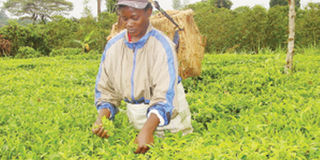KTDA seeks to dig out tea farmers

Rose Njeri picks tea at her farm in Othaya, Central Kenya. Photo/MUCHIRI GITONGA
Is divorcing farmers from the shareholding of tea factory companies the panacea to the problems facing small-scale industry?
Faced with a rising clamour to revert the tea management firm to the government, Kenya Tea Development Agency officials are quietly advocating this route as a way of dealing with the crisis in the sector.
But tea growers are also in agreement that the buyer-seller partnership is what their relationship with the agency should be. “There is a lot of discussion regarding some of the proposals and recommendations by the tea task force.
But this one seems to be agreed on by everyone-that the relation between the growers and KTDA should be similar to that of dairy farmers and the New KCC,” the agency’s corporate communications manager Charles Kimathi said.
According to him the agency is seriously looking for proposals touching on critical areas such as governance structure which has proved to be a thorn on the growers’ flesh.
Mr Kimathi said the agency was already implementing some of the proposals like the election of a third of factory directors through a weighted voting, which is based on green leaf delivery in addition to shareholding.
The move to de-link growers from the ownership of the factories would help pad the blame that has lately been heaped on the agency as fortunes dwindle.
Recently, MPs from tea growing regions berated the government for failing to change the status of the agency in spite of the High Court having annulled its privatisation two years ago.
Following criticism by Imenti Central MP Gitobu Imanyara and his Gwasi counterpart John Mbadi, Agriculture assistant minister Gideon Ndambuki pledged that the government would return the agency’s management to the public.
This statement came almost a year after twenty MPs led by then Agriculture Assistant minister Kariuki Muiruri, passed a motion urging then Agriculture minister Kipruto Kirwa to rescind a legal notice which created the agency in 1999 and made it to operate as a private limited company.
But KTDA and the growers say entering into supply level agreements with farmers would be the best way to end the endless wrangles between them. Under this system, the farmer would be paid on the spot upon delivery of their crop ,but with the rider that the farmers would have to forgo their shareholding in the factory.
The proposal is borrowed from the recommendations of a task force on the tea industry appointed by former Agriculture minister Kipruto arap Kirwa last year. Among its raft of recommendations was the transformation of the agency into a holding company and the formation of a subsidiary company to manage the factory companies.
“The company should enter into a supply agreement with the growers regarding the delivery of green leaf to the factory,” recommends the task force, adding that such a subsidiary, leveraging on its experience to manage tea factories in Kenya, should be able to extend its operations to other countries.
A former managing director of KTDA, Mr Eustace Karanja, however faults this recommendation, saying it would not be practical since the entities cannot be owned by shareholders who are not tea farmers.
“There is no way you can de-link growers from ownership of the factory companies without dissolving them. The farmers would gain nothing from such a move,” Mr Karanja, now the chairman of Ragati factory, said.
Since the privatisation of the KTDA in 2000 growers have been pointing out the conflict in the laws governing the industry. First there is the issue of ownership and structure of the agency.
“Factories are companies that were formed under Cap 486, while leaf collection centres are under Cap 343 which is the Agriculture Act. This conflict was not there where when the agency was under the control of the government,” says Mr Muchiri Kogi, a farmer from Othaya.
According to him when the KTDA was in the hands of the government, the issues pertaining to production at the farm level were dealt by leaf bases in the respective factories.
However, with the privatisation of the authority the leaf bases, whose main objective was to address technical challenges facing the growers, were left all at sea.
“The accounts of the factory companies start at the factory level and they do not consider the cost of production at the farm level. It would be good if factories become and the sellers of green leaf,” says Mr Kogi.




